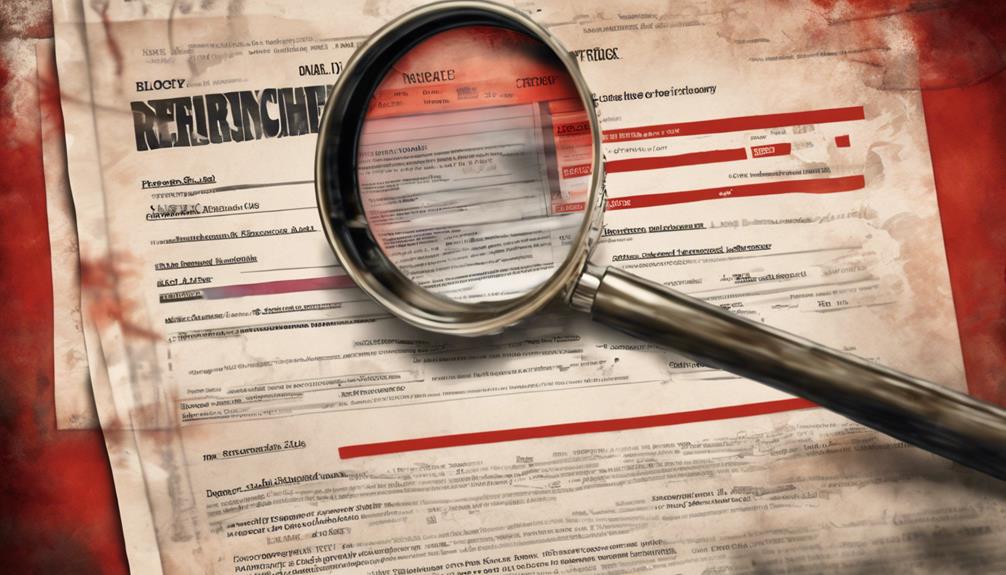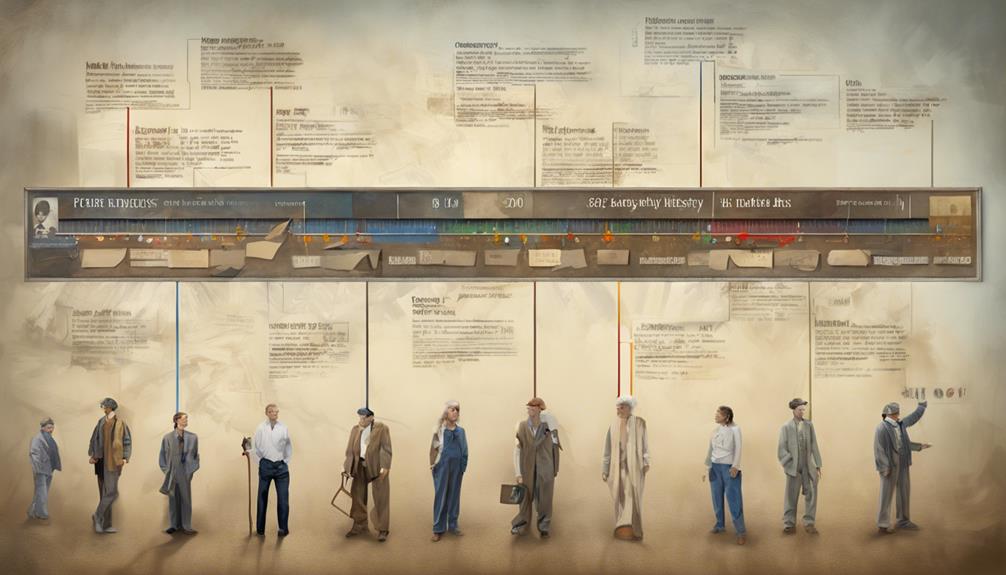Identity Verification confirms key details like name, address, SSN, and date of birth, preventing fraud in the hiring process. Financial Position Screening is important for safeguarding financial data, especially for sensitive roles. MVR Reports reveal driving history details and are necessary for evaluating risk in driving-related positions. Professional License & Education Background Checks guarantee candidates meet required standards, preventing falsified credentials. Criminal History Checks and more detailed insights will be uncovered.
Key Takeaways
- Identity Verification: Confirms vital details like name, address, SSN, and date of birth for fraud prevention.
- Financial Position Screening: Crucial for roles with financial access to uncover credit history and financial issues.
- MVR Reports: Provide driving history details like violations and accidents for assessing risk in driving roles.
- Professional License & Education Checks: Verify certifications and qualifications to ensure candidates meet standards.
- Criminal History Checks: Essential for evaluating past legal issues to maintain workplace integrity.
Types of Employment Background Checks

Employers perform various types of employment background checks to evaluate candidates' suitability for roles and mitigate potential risks. These checks cover criminal history, identity verification, credit checks, education verification, professional license validation, and Motor Vehicle Record (MVR) reports. By examining these aspects, employers aim to reduce workplace risks and guarantee a safe environment.
Criminal background checks are vital in evaluating any past legal issues that may pose a risk to the workplace. Identity verification confirms that the candidate is who they claim to be, safeguarding against identity fraud. Credit checks provide insights into an individual's financial responsibility, which can be pertinent for certain roles. Education verification ensures that candidates possess the necessary qualifications for the job, while professional license checks validate specialized credentials. MVR reports are crucial for roles involving driving responsibilities, ensuring the safety of both the employee and others.
Identity Verification
Identity verification in background checks encompasses confirming vital details like name, address, SSN, and date of birth. This process is essential in ensuring that individuals are accurately represented during the hiring process.
Preventing identity fraud and maintaining the integrity of the hiring process are critical aspects of identity verification.
Verification Process Explained
During the verification process, candidates' details such as name, address, SSN, and date of birth are confirmed to guarantee precision and reduce identity fraud risks. This step is essential in pre-employment background checks to confirm that prospective hires are who they claim to be, ultimately contributing to workplace safety.
Identity verification helps in detecting fraudulent or deceased SSNs and alerts, thereby enhancing the precision of candidate information. Platforms like ShareAble for Hires utilize record matching logic to minimize false matches during the identity verification process.
Importance of Accuracy
Ensuring accuracy in identity verification is paramount for maintaining a secure and trustworthy hiring process. Identity verification in background checks plays a crucial role in confirming essential details like name, address, and SSN. Detecting fraudulent or stolen SSNs during this process is vital as it helps prevent potential risks and ensures a secure hiring environment. Accuracy in identity verification also minimizes the chances of hiring individuals with false identities or misrepresented information, promoting a safe and reliable workplace. Tools such as ShareAble for Hires can significantly enhance accuracy by reducing false-positive matches and ensuring thorough screening. Employers rely on these verification processes to confirm the authenticity of candidates' identities, creating a foundation for a secure and transparent recruitment process.
| Importance of Accuracy | Benefits |
|---|---|
| Secure hiring process | Prevents risks |
| Authentic identity | Reduces false identities |
| Safe workplace | Ensures reliability |
| ShareAble for Hires | Enhances accuracy |
| Thorough screening | Minimizes false matches |
Preventing Identity Fraud
Maintaining a secure hiring process involves thorough identity verification checks to prevent potential identity fraud. Identity verification background checks confirm essential details such as a candidate's name, address, SSN, and date of birth, ensuring they're accurately represented.
These checks are pivotal in detecting fraudulent SSNs, initial fraud alerts, and active duty alerts, safeguarding against misrepresentation. By employing record matching logic, services like ShareAble for Hires help reduce false-positive matches during the verification process.
Confirming the identity of prospective hires enables companies to make informed hiring decisions and mitigates the risk of fraud within the workplace. Investing as little as $40 in screening applicants can shield your company from the repercussions of hiring individuals with misrepresented identities, emphasizing the importance of thorough identity verification in the hiring process.
Criminal Background Checks

Criminal background checks involve scanning county, state, and federal records for various types of criminal history information. County criminal checks focus on specific counties, providing detailed records, while state background checks offer varying degrees of coverage.
National criminal database searches compile data from state repositories to offer a comprehensive criminal history check. These extensive background checks, often part of Level 4 background checks, are essential for roles involving security responsibilities or access to sensitive financial information.
Employers use criminal background checks as part of the employment background check process to make informed hiring choices. By complying with regulations such as the Fair Credit Reporting Act, organizations ensure they mitigate risks associated with new hires.
Checking for arrests, convictions, warrants, sex offenses, and incarceration details, criminal background checks play a crucial role in safeguarding workplaces and communities.
Credit Background Checks
Credit background checks play a vital role in evaluating an individual's financial responsibility, helping employers make informed decisions. These checks are effective in preventing fraud and identifying potential risks associated with poor credit or financial irresponsibility.
Credit Check Importance
For positions involving financial responsibilities, understanding an individual's credit history is a critical step in the hiring process. Conducting a credit background check is essential for roles that require financial integrity and involve sensitive financial transactions.
These checks provide insight into an individual's financial responsibility, highlighting tax liens, debt issues, and potential financial risks. Employers rely on credit checks to mitigate the risk of fraud and other financial crimes, especially in positions handling confidential information or requiring access to sensitive financial data.
By incorporating credit screening into their hiring process, organizations can filter out candidates with a history of financial irresponsibility, thereby safeguarding their financial integrity.
Ultimately, examining credit histories enables employers to make informed decisions, reduce the likelihood of financial risks, and protect the financial well-being of their businesses.
Fraud Prevention Benefits
Employers benefit greatly from conducting thorough background checks to prevent fraudulent activities within their organizations. Credit background checks play a crucial role in fraud prevention by revealing tax liens, debt issues, and financial irresponsibility that could indicate a candidate's propensity for financial crimes.
For positions requiring security clearance or access to sensitive financial information, these checks are essential to safeguard the company from potential risks. By screening candidates through credit background checks, employers can create a more secure work environment and protect confidential data from unauthorized access or misuse.
Ensuring that all employees undergo these checks helps in filtering out individuals who may pose a threat to the organization's financial integrity. Ultimately, the implementation of credit background checks is a proactive measure that aids in maintaining the trustworthiness of the workforce and upholding the security of financial assets within a company.
Financial Position Screening
Conducting in-depth financial position screenings is essential for ensuring the integrity and security of sensitive financial information within organizations. Credit background checks play a pivotal role in this process, especially for positions involving finances, security clearance, or access to sensitive financial data.
These checks can uncover issues such as tax liens, debt problems, poor credit history, and financial irresponsibility, which could pose significant risks to a company's financial well-being. Roles that involve handling company finances or confidential information benefit greatly from thorough credit background checks.
By implementing these screenings for all employees, organizations can mitigate potential risks associated with financial misconduct or inappropriate handling of sensitive data.
Ultimately, in-depth financial position screenings through credit background checks are essential in safeguarding company finances and maintaining the trust and security of sensitive information within the workplace.
MVR Reports

Driving history reports, also known as MVR reports, provide vital details about a candidate's past experiences behind the wheel. These reports encompass the individual's driving history, including any traffic violations, accidents, and current license status.
For roles involving driving responsibilities, such as delivery drivers or chauffeurs, MVR reports are essential in evaluating a candidate's risk level and determining their suitability for positions requiring transportation roles. Employers rely on MVR reports to guarantee the safety and reliability of candidates for driving-related roles within their organizations.
Professional License & Education Background Checks
Verifying candidates' claimed certifications and educational qualifications, as well as conducting professional license and education background checks, play an important role in ensuring the suitability of applicants for specific roles. Employers rely on these checks to verify the candidates' credentials, ensuring they meet the necessary standards for the job.
Here are some key points about professional license and education background checks:
- Ensuring Legitimacy: These checks help prevent hiring individuals with falsified credentials, maintaining the integrity of the hiring process.
- Confirming Authenticity: Employers benefit from these checks to verify the candidates' educational and professional qualifications, ensuring they have the required skills for the role.
- Role-Specific Requirements: Professional license and education background checks are vital for positions that demand specific qualifications or licenses, guaranteeing that candidates possess the necessary expertise.
Frequently Asked Questions
What Is the Most Commonly Used Background Check?
The most commonly used background check is the criminal background check. Employers rely on it to assess a candidate's suitability for roles involving security, finances, or sensitive information. It helps identify any red flags in a candidate's past behavior.
What Is the Highest Level Background Check?
The highest level background check, Level 4, is ideal for executives or high-security roles. It includes extensive screenings like county criminal searches, national database checks, and federal civil searches. These checks offer advanced screening measures for top-level positions.
Which of the Following Are Types of Background Checks?
Employers, landlords, and gun dealers commonly conduct background checks for various purposes. Examples include criminal background checks for employment screening, tenant screening for property rentals, and gun sales background checks to guarantee public safety.
What Is a Level 3 Background Check in Florida?
A Level 3 background check in Florida is a thorough screening process recommended for security-sensitive industries. It includes checks on financial history, credit reports, and health screenings to guarantee transparency and confidence in hiring decisions.
Conclusion
To sum up, background checks are essential for ensuring the safety and integrity of a workplace. Employers must conduct thorough screenings, including:
- Identity verification
- Criminal background checks
- Credit checks
- MVR reports
- Professional license & education verifications
Remember, in today's fast-paced world, it's wiser to be safe than sorry.









